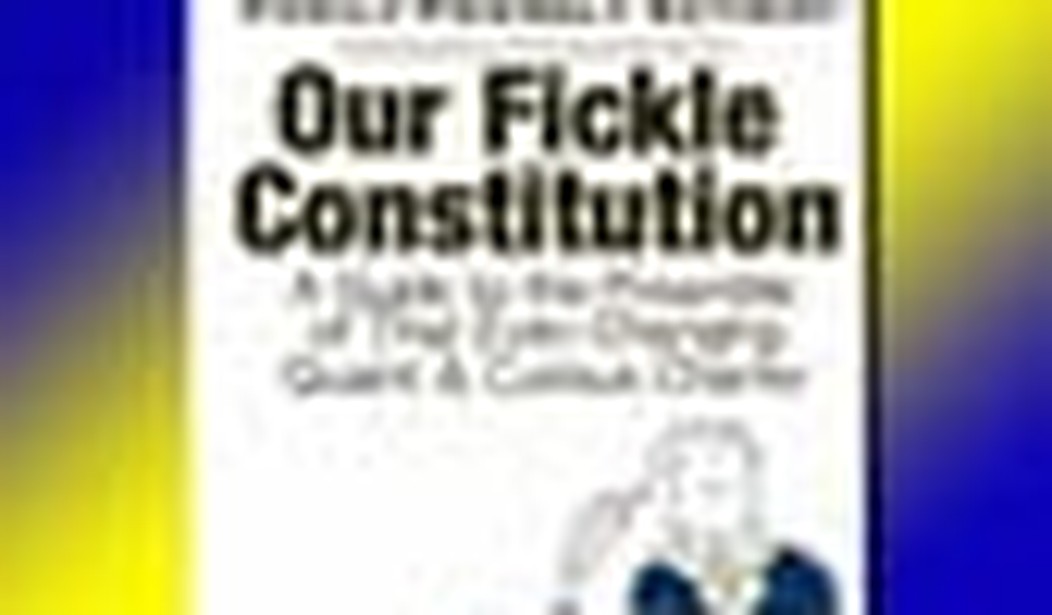I lived in Houston in the early 1990s and went to a Presbyterian church where the pastor used to remind us to check ourselves for contradictions. He warned that we unknowingly hold to contradictions in our thinking, and that while these sometimes flesh themselves out in a way that makes them obvious and allows us to get rid of them, they often lie below the surface of our thinking, so that we carry about in our minds thoughts that are in conflict with one another and with reality.
And this practice of checking ourselves for contradictions came to mind again and again as I read Scott Ott’s new book Our Fickle Constitution — a book that not only provides a satirical look at the left’s approach to the Constitution, but which does so in a way that also reminds us, as conservatives, about what we know to be true about the Constitution as well.
In short, Ott exposes contradictions in thought.
Our Fickle Constitution focuses solely on the preamble to the Constitution, so it is concise. And the brevity serves Ott well in making his point in a way that is effective without being redundant.
Here is the preamble to the Constitution:
We, the People of the United States, in order to form a more perfect union, establish justice, insure domestic tranquility, provide for the common defense, promote the general Welfare, and secure the Blessings of Liberty to ourselves and our Posterity, do ordain and establish this Constitution for the United States of America.
These words, remarkable in any age to any reader who rightly understands what the framers were up against and what the framers intended for this nation, are perverted with purpose throughout Ott’s book. And the perversion proves to be a powerful demonstration of the contradictory and demeaning nature of leftist deconstructionalism.
In the book’s preface, Ott wades toward the preamble with phrases like “The deepest thoughts of the late-18th century comprise the shallow end of the intellectual pool for today’s jurists” and “Studying the Constitution requires a great deal of humility on your part. But don’t fret. You’ll know what it means when the judges and academics tell you.”
He adds: “The good news is, if you don’t agree with what the Constitution says today, hang in there – it’s not like the thing is engrossed on parchment and preserved in a case of titanium and high-tensile glass, surrounded by argon gas to protect it from decay. Everything changes, even the meaning of the Constitution.”
By the time the preface is over, the reader is well on his way to understanding that the left approaches the Constitution as a painter approaches a blank canvas. They see nothing from which to draw meaning; rather, they see just space on which to project it.
And once the chapters start, Ott hits his stride.
From the word “We” he posits that “The Framers set the tone for our system of collective governance right from the start” and then infers that “21st century conservatives who press for individualistic interpretation of the document must shut their mouths and hang their heads in the face of this two letter-letter declaration of our ‘We-ness.’”
And for those who search through the Constitution looking for the “original intent” of the Founding Fathers, Ott shows that it doesn’t matter because the combination of “We” and the definite article “the,” along with “people,” indicates that “We, the people” applies only to “‘the’ people of 1787-88.” In other words, only those in that place and time needed to bother figuring out what the Founders did and didn’t mean.
Ott continues to show the emptiness and danger of the left’s approach to the Constitution when he satirically highlights the collective nature of the preamble, visible in the words “in order to form.” He shows that this was clearly (wink-wink, nod-nod) intended to demonstrate that “the problem with individualism, and so-called ‘liberty’ is its inherent disorderly nature. When each man or woman runs hither and yon, doing as she or he pleases, we sacrifice the stability necessary for effective governance.”
In other words, leftists won’t come right out and say it, but it’s hard to control a free people.
He revisits this theme when discussing the phrase “a more perfect union” to show that our Founders may have actually wanted better unionization among the people as a whole, to protect them from the dangers of greedy capitalists of course. And later still in his book, when dealing with “provide,” he is able to show that “the federal government will ‘provide.’” Obviously meaning that we need not lift a finger or worry one bit about things like jobs, or saving money for the future, or any such thing.
And on and on Ott goes. And he makes his point with such force that the outrageous may at times lead the reader to outrage — outrage over the fact that left has hijacked a document so precious, has deconstructed a charter so important, and has lied to generation after generation about the true “Blessings of Liberty.”
Our Fickle Constitution is a must read for every conservative who hasn’t taken time to check himself for contradictions lately. For by highlighting the numerous problems with the left’s approach to the Constitution, this book actually causes us to think about the real meaning of that document.








Join the conversation as a VIP Member